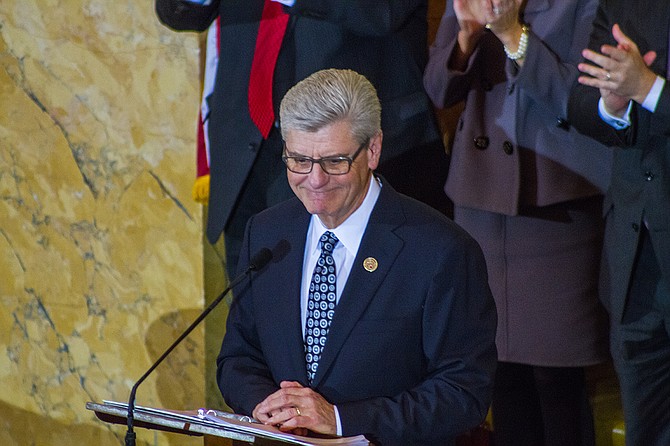A new study ranked Mississippi as the least educated state in the country, less than two weeks after Gov. Phil Bryant declared the state's education system "clearly better than it has ever been before." Photo by Stephen Wilson.
JACKSON — Mississippi claims the top spot as the least educated state in the country in a new study out just two weeks after Gov. Phil Bryant proclaimed that Mississippi's educational system "is clearly better than it has ever been before" in his final State of the State Address on Jan. 9.
In assessing state rankings, personal-finance website WalletHub considered the following factors: educational attainment, school quality, and achievement gaps by race and gender.
Mississippi snagged the title of least educated thanks to its poor performance in several categories. Among U.S. states, Mississippi is third lowest in the percent of its population with a high school diploma at 83.4 percent; fifth lowest in percent with some college experience or an associate's degree at 53 percent; the second lowest with a bachelor's degree at 21.3 percent; and the fourth lowest with a graduate or professional degree at just 8 percent.
The state had the highest gender gap nationwide in educational achievement and lands right near the middle for racial achievement gap at No. 24. It ranks 40th in university quality.
Mississippi is dead last in one category: Only 6.5 percent of high-school students scored 3 or higher on advancement placement exams.
Just behind Mississippi, in order, are West Virginia, Louisiana, Arkansas, and Alabama. On the flip side, Massachusetts topped the list of most educated states.
Bryant's Rosy, Inaccurate Statements on Education
The data conflict with the rosy picture Bryant painted in his address, when he incorrectly claimed Mississippi is fourth in the nation for teachers earning National Board Certification (Mississippi is seventh), touted the fact that 93 percent of third graders passed the state's language arts assessment (when he incorrectly conflated "passing" with "proficiency")," and pointed to the state's rising graduation rate.
Even though Mississippi's high- school graduation rate has risen three years in a row to 84 percent, it still lags behind states like Alabama, which had an 87-percent graduation rate in 2017, and West Virginia, whose graduation rate rose to more than 89 percent in 2016.
"The proverbial critics would have you believe that one is a declining state whose people are suffering mightily," Bryant said in the speech. "They search for problems as if there is a reward for finding them."
He also criticized the tendency for news organizations to take "any study, from any source, that labels Mississippi last or least" and "(blast it) across the front page."
He called for lawmakers to approve a pay raise for teachers this legislative session. The last time the state's teachers saw a pay raise was in 2014.
Crackdowns, 'School Choice' and Vouchers
Lawmakers have introduced a series of bills addressing other education topics, too. House Rep. Omeria Scott, D-Laurel, introduced legislation that would crack down on students and parents of students with unexcused absences. House Bill 10 would require schools to hire "school attendance officers" who would "visit the homes of certain children within 72 hours of an unexcused absence."
Another of Scott's bills, House Bill 11, mandates "compulsory school attendance" in which three "unlawful absences" trigger a youth court petition and offer up community service as a penalty.
State Sen. Michael Watson, R-Pascagoula, introduced a bill to implement a state- income tax deduction for parents who homeschool or send their kids to private school.
Legislation like Watson's, which supporters refer to as "school choice," is controversial because it historically has helped fund white parents' wishes to pull their children out of integrated schools and to place them into segregation academies. WalletHub's analysis finds that Mississippi ranks no. 1 when it comes to states with voucher programs that help fund private schools.
As part of its study, WalletHub spoke to experts on education from institutions across the country about how states like Mississippi can improve their schools.
"There's a need to develop or create partnerships between K-12, community colleges, and 4 year institutions," LaVerne Gyant, a Northern Illinois University education professor told WalletHub. "These partnerships will allow all parties to work together, find ways to assist students, teachers, and parents to make sure students reach their potential. As these partnerships develop, we will see the number of students having access to higher education increase, and the completion numbers on all sides increase."
Early this month, Mississippi Secretary of State Delbert Hosemann argued that the state needs to do more to connect high school students to businesses and future employers.
Richard Fossey, a professor at the University of Louisiana at Lafayette, told WalletHub that he sees better pay for teachers and better working conditions as a necessity for fighting "brain drain" in Deep South states like his.
"I live in Louisiana, which has some of the worst public schools in the United States," Fossey said. "Moreover, some of our most talented young people are leaving the state. In particular, the best and most capable graduates of Louisiana's teacher preparation programs leave Louisiana right after graduating to take jobs in Texas school districts, where pay, benefits and working conditions are far superior."
A 2017 report found that millennials are leaving Mississippi at a faster rate than in any other state.
Follow Jackson Free Press State Reporter Ashton Pittman on Twitter @ashtonpittman. Email him story tips to [email protected].
More like this story
More stories by this author
- Governor Attempts to Ban Mississippi Abortions, Citing Need to Preserve PPE
- Rep. Palazzo: Rural Hospitals ‘On Brink’ of ‘Collapse,’ Need Relief Amid Pandemic
- Two Mississippi Congressmen Skip Vote on COVID-19 Emergency Response Bill
- 'Do Not Go to Church': Three Forrest County Coronavirus Cases Bring Warnings
- 'An Abortion Desert': Mississippi Women May Feel Effect of Louisiana Case


